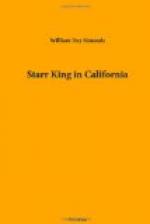The same may be said of the life and work of a still more brilliant opponent of slavery on this Coast, Col. Edward D. Baker, a man of phenomenal eloquence, with a well earned reputation as a successful lawyer and politician, with an honorable record for gallant service in the Mexican War, and for useful service in the House of Representatives in Washington. When he located in San Francisco in 1852, an immigrant from the great State of Illinois, he brought new strength to the minority who were in conscience opposed to the growing dominion of the Slave Power. For certain reasons, well understood at the time and which do not concern us here, Col. Baker did not wield the influence which his talents would naturally have secured for him. Yet as the contest deepened, his majestic eloquence was beyond question a force for freedom in a community where the love of oratory amounted to a passion. In the Fremont Campaign, at the grave of Broderick, and in his own canvass for Congress in 1859, he rendered most valuable service in laying the foundations of Republicanism on the Pacific Coast. But it should be remembered by all who would deal with those great days fairly that the work of Edward Dickinson Baker at its best was only the work of a brilliant forerunner. Before the real battle was on he removed from the State, and as the newly elected United States Senator from Oregon, from this Coast. It is true that on his journey to Washington a few days before the National election in November, 1860, Baker delivered in San Francisco an effective speech on Lincoln’s behalf, but it is foolish hero-worship to say, of California! Not only had Baker been defeated overwhelmingly a few months earlier as Republican candidate for Congress, but Lincoln himself received the electoral vote of California only as the result of a three-sided contest in which the combined opposition polled nearly three-fourths of all the votes cast. In fact Lincoln distanced his nearest Democratic rival by only 711 Votes. Out of one hundred and fourteen members of the state legislature but twenty-four belonged to the party of Lincoln. The Congressional Delegation was solidly Democratic, and the Governor was a Southern sympathizer. Such was the condition after Baker’s work was done in California, and when the greater work of Starr King was just beginning.
In justice to Colonel Baker, though it is no part of our duty here, we make grateful mention of the fact that not on the Pacific Coast but in Washington, as the friend and adviser of President Lincoln, and on the floor of the United States Senate, this gallant defender of Union and Liberty rendered a unique and memorable service to his country. His replies in the Senate to those giants of the Confederacy, John C. Breckenridge and Judah P. Benjamin attained the dignity of national events, and his heroic death early in the war on field of battle renders it forever impossible for any just man to belittle the deeds or influence of Edward D. Baker. What he might have effected had he remained in California, or had his life been longer spared, we may not say. The fact remains that after his mission among us was over Southern and Democratic sentiment was still in the ascendant. It was reserved for another, — the privilege and the honor of “saving California to the Union.”




